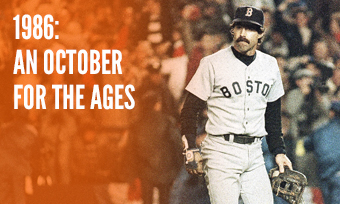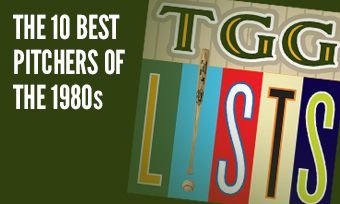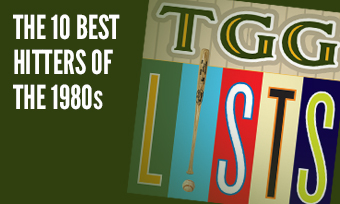The Yearly Reader
Leaders and Honors, 1986
Our list of baseball’s top 10 hitters and pitchers in both the American League and National League for the 1986 baseball season, as well as the awards and honors given to the game’s top achievers of the year.
The National League’s Top 10 Hitters, 1986
Bold type in brick red indicates league leader.
1. Mike Schmidt, Philadelphia
Key Numbers: .290 average, 97 runs, 29 doubles, 37 home runs, 119 RBIs, 89 walks, 25 intentional walks, .547 slugging percentage.
Back home at third base a year after being manned at first, Schmidt responded with his last MVP—leading the NL in home runs and RBIs together for his third and last time.
2. Tim Raines, Montreal
Key Numbers: .334 average, 91 runs, 194 hits, 35 doubles, 10 triples, 9 home runs, 62 RBIs, 78 walks, 70 stolen bases, .413 on-base percentage.
At the top of his game, Raines pulled in his only batting title in the midst of a three-year run in which he’d hit .329.
3. Von Hayes, Philadelphia
Key Numbers: .305 average, 107 runs, 186 hits, 46 doubles, 19 home runs, 98 RBIs, 24 stolen bases.
Hayes finally had the kind of season that Phillies fans had booed him for not having since showing up in 1983.
4. Eric Davis, Cincinnati
Key Numbers: 132 games, .277 average, 97 runs, 27 home runs, 71 RBIs, 80 stolen bases.
The 24-year-old breakout star had the kind of season and five-tool skills that had Reds fans certain that the Second Coming of Willie Mays had arrived.
5. Kevin McReynolds, San Diego
Key Numbers: .288 average, 89 runs, 31 doubles, 6 triples, 26 home runs, 96 RBIs.
As poker-faced as they came, the young Padre began a long, steady existence as Mr. .280-25-90-ish.
6. Darryl Strawberry, New York
Key Numbers: 136 games, .259 average, 76 runs, 27 doubles, 5 triples, 27 home runs, 93 RBIs, 28 stolen bases.
Teammates in a turbulent (but winning) clubhouse continued to tolerate Strawberry’s numbers, but were growing increasingly impatient with his growing substance abuse and attitude issues.
7. Tony Gwynn, San Diego
Key Numbers: .329 average, 642-at-bats, 107 runs, 211 hits, 33 doubles, 7 triples, 14 home runs, 59 RBIs, 37 stolen bases.
Gwynn’s shots at a second batting title faded with a subtle September showing; he finished five points behind NL leader Tim Raines.
8. Keith Hernandez, New York
Key Numbers: .310 average, 94 runs, 171 hits, 34 doubles, 13 home runs, 83 RBIs, 94 walks.
Status whoa: As consistent a .300 hitter as one would find, Hernandez for the third straight year hit .310, give or take a point.
9. Steve Sax, Los Angeles
Key Numbers: .332 average, 91 runs, 210 hits, 43 doubles, 6 home runs, 56 RBIs, 40 stolen bases.
Sax began to put his past defensive problems at second base behind him, and they may have contributed to much improved hitting—which rose 60 batting points over his career average coming into the season.
10. Glenn Davis, Houston
Key Numbers: .265 average, 91 runs, 32 doubles, 31 home runs, 101 RBIs.
Davis gave the Astros something they hadn’t seen in nearly a generation: A power hitter.
The American League’s Top 10 Hitters, 1986
1. Don Mattingly, New York
Key Numbers: 162 games, .352 average, 677 at-bats, 117 runs, 238 hits, 53 doubles, 31 home runs, 113 RBIs, .573 slugging percentage.
Mattingly was never more awesome—and never more adored by Yankees fans; he set season franchise records for hits and doubles—and struck out only 35 times over 742 plate appearances.
2. Rickey Henderson, New York
Key Numbers: .263 average, 130 runs, 31 doubles, 5 triples, 28 home runs, 74 RBIs, 89 walks, 87 stolen bases, 18 caught stealing.
Despite all the runs, steals, walks—even home runs (a career-high 28)—Henderson didn’t attract a single vote in the AL MVP conversation. Even Dick Schofield and Scott Fletcher got some love over a shut-out Rickey.
3. Kirby Puckett, Minnesota
Key Numbers: .328 average, 680-at-bats, 119 runs, 223 hits, 37 doubles, 6 triples, 31 home runs, 96 RBIs, 20 stolen bases.
From zero to 31 in two years flat: Puckett’s stunning surge in home run power—thanks to offseason tips from former Twins star Tony Oliva—transformed him into a genuine MVP-level threat.
4. Joe Carter, Cleveland
Key Numbers: 162 games, .302 average, 663 at-bats, 108 runs, 200 hits, 36 doubles, 9 triples, 29 home runs, 121 RBIs, 29 stolen bases.
In helping to lead the Indians to their best record since 1968, Carter was omnipresent; he enjoyed the first of five career three-homer games, hit for his lone cycle, and three times had five hits in game—the only three of his career. It was enough for Sports Illustrated to assume he would elevate the Indians to a World Series in 1987. (They lost 101 instead.)
5. Jesse Barfield, Toronto
Key Numbers: .289 average, 107 runs, 170 hits, 35 doubles, 40 home runs, 108 RBIs.
Barfield went homerless through his first 15 games with 21 strikeouts over 57 at-bats before turning the season around and becoming the first Blue Jay to go deep 40 times.
6. Kirk Gibson, Detroit
Key Numbers: 119 games, .268 average, 84 runs, 28 home runs, 86 RBIs, 68 walks, 34 stolen bases.
If not for a significant ankle injury that cost him over a month of play in midspring, Gibson would have easily set career highs in most major offensive categories.
7. Wade Boggs, Boston
Key Numbers: .357 average, 107 runs, 207 hits, 47 doubles, 8 home runs, 71 RBIs, 105 walks, .453 on-base percentage.
The reigning and, still, AL batting champ retained a .400 average as late as June 7—the latest date of his career—before a July slide (.247) doomed any chance of maintaining the hallowed milestone to the end.
8. George Bell, Toronto
Key Numbers: .309 average, 641 at-bats, 101 runs, 198 hits, 38 doubles, 6 triples, 31 home runs, 108 RBIs.
The steady maturation of the 27-year-old Dominican slugger continued, before exploding to MVP-level form the following year.
9. Jim Rice, Boston
Key Numbers: .324 average, 98 runs, 200 hits, 39 doubles, 20 home runs, 110 RBIs.
In his last truly productive year, Rice rekindled memories of younger days when a single in his last at-bat of the season gave him 200 for the first time since reaching the milestone in three successive seasons, 1977-79.
10. Rob Deer, Milwaukee
Key Numbers: 134 games, .232 average, 75 runs, 33 home runs, 86 RBIs, 72 walks, 179 strikeouts.
Criticized as an unapologetic all-or-nothing talent, it must be said that despite the low average and high strikeout total, Deer hit far more home runs than any other Brewer (Cecil Cooper was second with 12), and only Robin Yount had a better OPS—and barely (.838 to .830).
The National League’s Top 10 Pitchers, 1986
1. Mike Scott, Houston
Key Numbers: 2.22 ERA, 18 wins, 10 losses, 37 starts, 5 shutouts, 275.1 innings, 306 strikeouts, 41 stolen bases allowed.
Imagine how much better the Mets’ pitching would have been had they not traded the Cy Young Award winner for part-timer Danny Heep in 1983.
2. Fernando Valenzuela, Los Angeles
Key Numbers: 3.14 ERA, 21 wins, 11 losses, 34 starts, 20 complete games, 269.1 innings, 14 wild pitches.
Valenzuela had his one and only 20-win season of his 17-year career—and is the last pitcher to-date to go the distance 20 or more times.
3. Bob Ojeda, New York
Key Numbers: 2.57 ERA, 18 wins, 5 losses, .783 win percentage, 30 starts, 217.1 innings, 52 walks, 27 stolen bases allowed.
After struggling to fit in with Boston, the southpaw was dealt to the rowdy Mets and enjoyed a career effort that included two solid World Series starts against…the Red Sox.
4. Dwight Gooden, New York
Key Numbers: 2.84 ERA, 17 wins, 6 losses, .739 win percentage, 33 starts, 250 innings, 33 stolen bases allowed.
Dr. K ran his career ledger to-date to 58-19 and batters hit just .169 against him with runners in scoring position, even as substance-abuse intake emerged as one of his more active hobbies.
5. Mike Krukow, San Francisco
Key Numbers: 2.94 ERA, 20 wins, 9 losses, .690 win percentage, 34 starts, 245 innings, 55 walks, 23 stolen bases allowed.
Fleetingly free of injuries and hard luck, the veteran righty and future Giants broadcaster bolted to 20 wins after never coming close before or since.
6. Rick Rhoden, Pittsburgh
Key Numbers: 2.84 ERA, 15 wins, 12 losses, 34 starts, 253.2 innings.
From Rick Rhoden to Rick Reuschel to Rick Rhoden; this year, it was Rhoden’s turn to singularly hold up the fort of the Pirates’ staff, bouncing back from a miserable 1985 campaign while the rest of the rotation (a slumping Reuschel included) combined for a 28-56 record.
7. Bob Knepper, Houston
Key Numbers: 3.14 ERA, 17 wins, 12 losses, 40 appearances, 38 starts, 5 shutouts, 258 innings, 24 grounded into double plays.
Knepper was lost in the shadows of Mike Scott’s unbelievable output, but continued to make headlines for his criticism of female reporters.
8. Danny Cox, St. Louis
Key Numbers: 2.90 ERA, 12 wins, 13 losses, 32 starts, 220 innings.
Cursed by a slow start and a suddenly AWOL Cardinals offense, Cox regrouped and went 9-5 with a 2.04 ERA after July 22.
9. John Tudor, St. Louis
Key Numbers: 2.92 ERA, 13 wins, 7 losses, 30 starts, 219 innings.
Tudor was luckier than Cox on the support front; he remained stellar despite a shutout total that went from 10 in 1985 to zero.
10. Roger McDowell, New York
Key Numbers: 3.02 ERA, 14 wins, 9 losses, 22 saves, 6 blown saves, 75 appearances, 128 innings.
Sharing closer duty with Jesse Orosco, the second-year righty won enough games to be confused for a Mets starter—and achieved later claim as the ‘second spitter’ on a popular Seinfeld episode with teammate Keith Hernandez.
The American League’s Top 10 Pitchers, 1986
1. Roger Clemens, Boston
Key Numbers: 2.48 ERA, 24 wins, 4 losses, .857 win percentage, 33 starts, 254 innings, 238 strikeouts, 11 wild pitches.
Maybe this is why pitchers win MVPs: In one 3-10 stretch for the Red Sox, Clemens won all three games. One more statistical curio: After his 20-K masterpiece against Seattle on April 29, Clemens didn’t strike out more than 11 batters in any other start in 1986.
2. Mike Witt, California
Key Numbers: 2.84 ERA, 18 wins, 10 losses, 34 starts, 269 innings, 28 grounded into double plays.
Born, raised and schooled through college near Anaheim Stadium, Witt didn’t have to travel far to tell friends and family he’d made it as an Angels All-Star.
3. Mark Eichhorn, Toronto
Key Numbers: 1.72 ERA, 14 wins, 6 losses, .710 win percentage, 10 saves, 3 blown saves, 69 appearances, 157 innings, 14 intentional walks.
Not content with his tryout as a starter late in 1985, the Blue Jays considered Eichhorn as a long reliever instead—and the technically qualified rookie responded by sharing the team lead in wins with rotation guys Jim Clancy and Jimmy Key.
4. Ted Higuera, Milwaukee
Key Numbers: 2.79 ERA, 20 wins, 11 losses, 34 starts, 15 complete games, 248.1 innings.
In the second-year Higuera, Brewers fans boasted of a better Mexican pitching sensation than Fernando Valenzuela. No pitcher in Milwaukee has since won 20 games.
5. Kirk McCaskill, California
Key Numbers: 3.36 ERA, 17 wins, 10 losses, 33 starts, 246.1 innings, 10 wild pitches.
A good enough hockey player that he played professionally in an NHL developmental league, the Canadian-born McCaskill skated through an impressive sophomore effort at Anaheim.
6. Dave Righetti, New York
Key Numbers: 2.45 ERA, 8 wins, 8 losses, 46 saves, 10 blown saves, 74 appearances, 106.2 innings.
Rags earned saves in both ends of a doubleheader during the season’s final weekend to become the latest to break—for the moment—the all-time saves record.
7. Danny Jackson, Kansas City
Key Numbers: 3.20 ERA, 11 wins, 12 losses, 1 save, 32 appearances, 27 starts, 185.2 innings, 24 grounded into double plays.
The hard-luck pitcher of the year award goes to the lefty who received only 17 total runs of support in his 12 losses.
8. Jack Morris, Detroit
Key Numbers: 3.27 ERA, 21 wins, 8 losses, .724 win percentage, 35 starts, 6 shutouts, 267 innings, 21 stolen bases allowed, 20 grounded into double plays.
Morris arguably had the best year of his Hall-of-Fame career—though some would debate why a guy with a lifetime 3.90 ERA gets into Cooperstown, but never mind. The Detroit ace set career marks in wins, shutouts, consecutive scoreless innings (32)—and interestingly enough, home runs allowed (40).
9. Bruce Hurst, Boston
Key Numbers: 2.99 ERA, 13 wins, 8 losses, 25 starts, 174.1 innings.
Following three years of common results, Hurst burst after spending nearly two months on the shelf with a groin injury; postseason included, he was 11-3 with a 2.57 ERA from July 21 on.
10. Mark Gubicza, Kansas City
Key Numbers: 3.64 ERA, 12 wins, 6 losses, 35 appearances, 24 starts, 180.2 innings, 15 wild pitches.
Demoted to the bullpen late in June after a rough start, Gubicza returned to the rotation a month later and flourished toward better times.









